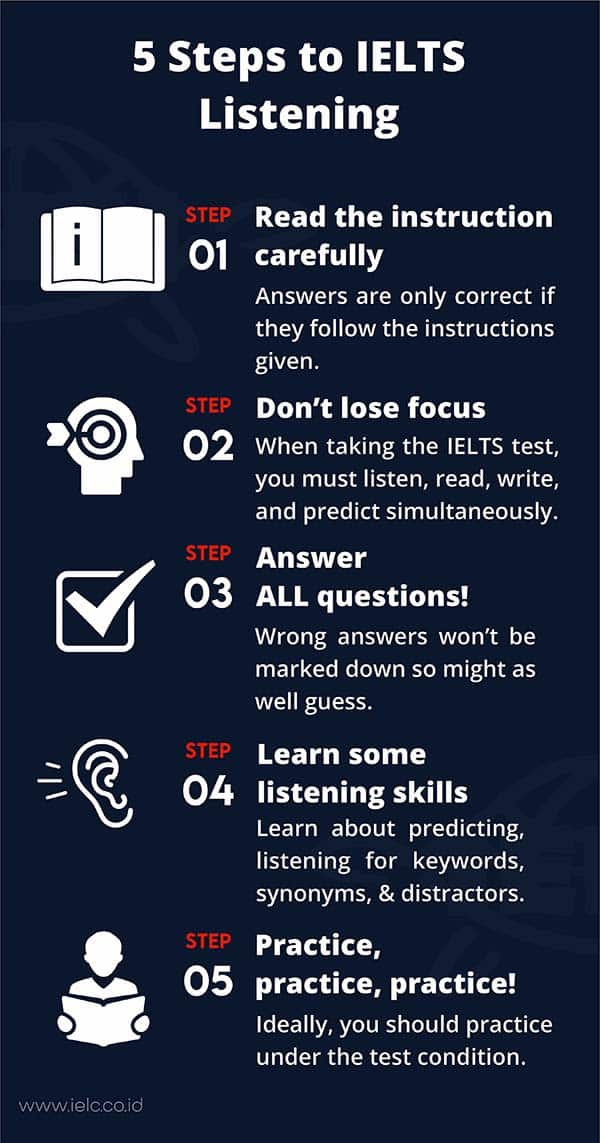
Tips and tricks to get a high score in the IELTS Listening
Do you have to take the IELTS test?
Dreading the listening part?
Are you considering to take an IELTS course? Don’t worry, you are in the right place.
In this article, we’ll give you the tips and tricks you need to ace this part!
Without further ado, let’s start ☺
What goes on in the IELTS listening module?
The IELTS listening module consists of 40 questions and the recording is divided into 4 sections:
- Conversation between 2 people in a social context
- A monologue/prompted monologue in a social context
- Conversation between up to 4 people in educational or training context
- A monologue on an academic subject
The recording will only be played once, so write the answers as you are listening to the recording. You are allowed to write your answers in the question booklet, and you will be given 10 minutes at the end of the test to transfer your answers to the answer sheet. You will also be given time to read through the questions before the recording is played.
There are 10 types of questions for IELTS listening. They are:
- Matching 6. Sentence completion
- Multiple choice 7. Summary completion
- Note completion 8. Short answer questions
- Form completion 9. Map & plan labelling
- Table completion 10. Diagram and flow chart completion
Now that you have some ideas on what the listening part will be like, let’s jump into the tips and strategies you can use to ace IELTS listening! ☺

1. Read the instruction carefully
This is quite obvious, but you’d be surprised at how many people seem to forget to read the instructions. Your answers will only be counted as correct if they are in accordance with the instructions given so do pay extra attention to the instruction. Here are some things you need to be mindful about:
- There will be a word limit for each set of questions. Pay attention to this and make sure you remember to read the word limit for the next set of questions as they might be different.
- know how numbers are calculated:
- A date, e.g., “1989” is considered one number
- A large number e.g., “1,500,725” is considered one word
- A hyphenated word e.g., “part-time” is considered one word
- A compound noun that is not hyphenated e.g., “bus driver” is considered two words
2. Don’t lose focus
As we’ve said, the recording will only be played once so you only have one chance. Be sure to give the recording your undivided attention!
One way to train your focus is to listen actively. Think about when you listen to music. You might zone out and don’t really register the lyrics. That’s called passive listening. Active listening means you have to do something while you are listening, just like you will when you take the IELTS test where you will have to listen, read, write, and predict at the same time!
One way to practice active listening is by listening to lectures or talks and taking notes while you’re listening. You can search TED talks on YouTube and take notes while you’re listening. Just play the video but don’t watch it. Put your attention to your notebook as you write.
If you find it difficult, you can play the video at half speed, then adjust as you get better. The point is to train your focus and multitasking skills. You can do it! ☺
3. Answer ALL questions!
In the IELTS listening module, you won’t be marked down for wrong answers so might as well guess if you don’t know the answer. Who knows, maybe your guess is right after all! So, answer all questions, there is nothing to lose if you do!
4. Learn some listening skills
There are some useful skills to master so you can ace your listening module:
- Predicting: You will be given time to look at the questions before the recording is played. Have a look through the questions and predict what kind of answer you should look for. Take a mental note on which question requires:
- A number?
- A person’s name?
- A place?
- A date?
- Address?
- Another word?
- Look for keywords: Keywords will help you predict and spot the answers. Sometimes, you might not have enough time to read through every single word in the question, so these keywords are useful and will give you clues for the answers. Keywords are:
- Names
- Numbers
- Adjectives
- Articles and quantifiers
- Unique words
- Synonym and paraphrasing: Expanding your synonym and paraphrasing skills will help you in all IELTS modules, including listening. The narrator might not use the exact same word as the keywords you’ve found. Instead, he or she will use a synonym to ensure you really understand the context instead of just recognizing words.
- Recognize distractors: For multiple-choice questions, it is likely that you will hear ALL the words that you are given in each choice. So, you need to listen very carefully to make sure you get the correct answer. Other times, the narrator might correct him or herself. For example:
Man: “Ok, I just have to fill this form for you. So what date do you want to book this for?”
Woman: “The 16th of October-Oh no, sorry, that’s my departure date. I arrive on the 17th, so book it for then, please”
You might have written 16th of October on your question sheet, but the answer is actually 17th of October
5. Practice, practice, practice!
No amount of tips and tricks can replace good ol ‘practicing!
Ideally, you should practice under the test condition. That is, you only play the recording once.
Don’t be discouraged if you don’t achieve your target score for the first few practices, that’s what the practice is for after all!
After each practice session, identify which question types you have difficulty with and if there’s any pattern in your mistakes (e.g., do you make those mistakes because of timing, grammar, or spelling?) and work on improving your skills in these areas.
Keep practising until you consistently get your desired score, good luck! ☺
Summary
We have discussed the strategies you need to ace the IELTS listening module. We hope you find it helpful and we wish you the best of luck with your IELTS exam. If you need any tips on the other modules, you can check them here.
Do you want to achieve your IELTS target?
Preparing for IELTS can be confusing! So, if you’re tired of wasting time on strategies that don’t work…
And
If you don’t want to waste money on courses that don’t help…
Then check out…
The best IELTS preparation course in Indonesia
At IELC, we teach IELTS the right way.
And
We teach you exactly how to achieve your IELTS target.
That’s why
We have the best track record in Indonesia for helping our students achieve their IELTS target.
And
We will make sure you achieve your target too!
Our experienced teachers will give you the tips, tricks, and strategies you need to succeed in IELTS and guide you along every step of the way until you achieve your dream IELTS target.
So check out our IELTS course to see how we can help you.
We have helped thousands of IELTS test takers achieve their targets IELTS scores and we would love to help you achieve your target too!
Sincerely,
Anthony McCormick,
IELC Managing Director
